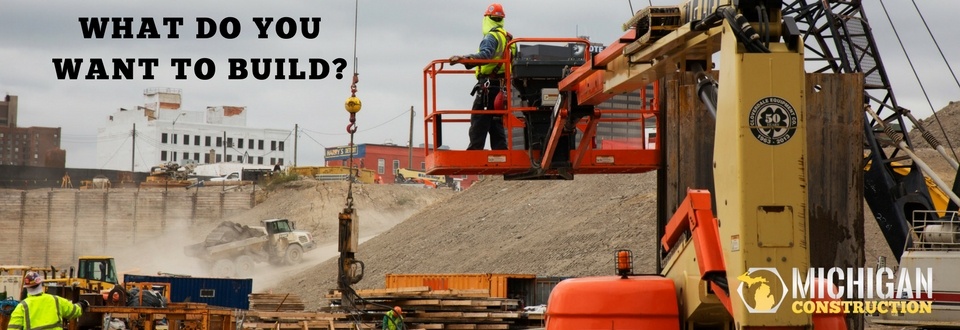
You’ve always loved building things, from Lincoln Logs™ and Legos™ to woodshop and working on your car. You liked geometry class, team sports. You are a problem solver. You want to build a meaningful career and change the world. You want to work construction and help to build a better Michigan. Knowing that you want to work in construction is a great start, but it’s still just a start.
You can't just head out the door tomorrow morning knowing that you want to be a carpenter and find a new career. You'll end up spinning your wheels and running down dead ends. Michigan Construction is building the bridge between vision and reality, helping you identify the right road so that you can efficiently apply yourself in every mile of the journey.
Oftentimes, people will tell you that the way to start a career in construction is to decide what you want to do. We say, first think about what you want to build, then decide what you want to do.
The Four Industry Sectors
So, if you want to get into the construction industry, you should decide what job you want to do, right? Wrong. First, you need to decide what you want to build. For example: A commercial carpenter is not the same as a residential carpenter. Licensing requirements, qualifications, skills tasks and access points to carpentry careers in the residential sector are not the same as carpenters who want to work in the commercial sector. So just knowing that you like working with a circular saw, hammer and nails, and that you want to be a carpenter is not going to provide you with a clear path towards your ideal career.
Michigan Construction reminds folks to think about construction occupations in terms of each of the four industry sectors and understand each has a unique career path for the same type occupation:
1. Residential
The residential construction sector builds, remodels and maintains the homes we all live in, from apartments to homes.
2. Commercial
The commercial construction sector builds, remodels and maintains the stores, offices, churches, hospitals, and schools we use every day.
3. Infrastructure
The infrastructure construction sector builds, remodels and maintains the roads, bridges, water systems and electrical grids that keep our communities running.
4. Industrial
The industrial construction sector builds, remodels and maintains the power plants, chemical plants and refineries that fuel our economy.
The Five Occupational Categories
Great! Now that you better understand the four sectors of construction, you can think about what type of job or career you want to pursue.
The jobs people do in construction are best organized into five categories:
1. Construction Management
Construction management firms assemble experts to manage entire construction projects from design to occupancy. If you are a big picture thinker, understand the entire construction process and are good with numbers, construction management might be for you.2. Architecture, Design and Engineering
Project design teams work to transform concepts into workable construction drawings, plans and specifications used to determine project costs and guide the construction phase of a project. If you are drawn to both art and science and want to translate vision into reality, architecture, design and engineering might be for you.3. Construction Trades
A construction trade is a specialization. There are many specialty trades that make up this strong backbone of the construction industry, such as electrician, plumber, bricklayer, iron worker and HVAC technician. If you are interested in specializing in an indispensible skill and putting in a hard day's work, the construction trades may be for you.4. Testing & Inspection
Professionals with specialized education and training test construction materials. They conduct testing of a variety of potential environmental hazards and inspect projects for complaince and adherence to building codes. If you are meticulous, this essential area of the construction industry may be for you.5. Equipment, Materials and Supplies
Material handlers, sales people, engineers, delivery drivers and other associated professionals make, distribute and sell the crucial products that make up every building and every project in the construction industry. If you are interested in manufacturing, have sales skills, like working with people or being an expert, then equipment, materials and supplies may be for you.
Recap
In order to get started with a career in construction, you need to decide what you want to build, then the role you want to play in building it. Let's go back to the carpenter example. If you want to be a carpenter, you need to first think about what you want to build: custom homes, shopping centers, iconic Michigan bridges, or factories. That way you will understand what kind of training you need in order to be qualified for your dream job.
Sounds Good — Now What?
Engage with Michigan Construction's resources to learn more about career paths. Click below to advance your career through training opportunities or connect with construction employers and potential career opportunities.


